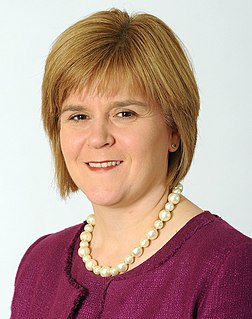
The first election to the devolved Scottish Parliament, to fill 129 seats, took place on 6 May 1999. Following the election, the Labour Party and the Liberal Democrats formed the Scottish Executive, with Labour Member of the Scottish Parliament (MSP) Donald Dewar becoming First Minister.
In Scotland, the Scottish National Party (SNP) is a centre left, social democratic political party which campaigns for Scottish independence. The SNP has controlled Scotland's devolved legislature since the 2007 election as a minority government, and since the 2011 election as a majority government. Its leader, Nicola Sturgeon, is the First Minister of Scotland.

Livingston is a county constituency of the House of Commons of the Parliament of the United Kingdom, to which it returns one Member of Parliament (MP). Elections are held using the first-past-the-post voting system.

Moray is a county constituency of the House of Commons of the Parliament of the United Kingdom. It elects one Member of Parliament (MP) by the first past the post system of election.
The Hamilton by-election in Hamilton, Lanarkshire, Scotland, was held on 2 November 1967. It saw a surprise victory for the Scottish National Party candidate Winnie Ewing. The SNP took 46% of the vote in a constituency which they had not even contested at the 1966 general election held the previous year, and gained the seat from the Labour Party with a swing of nearly 38%. Ewing did not retain the seat at the following general election, but the SNP have been continuously represented in the House of Commons ever since.
The Scottish Conservatives, officially the Scottish Conservative and Unionist Party, is the branch of the Conservative Party in the United Kingdom that operates in Scotland. Describing itself as a “patriotic party of the Scottish centre-right”, it is the second-largest party in the Scottish Parliament and Scottish local government. It also sends the second-largest Scottish representation to the House of Commons of the United Kingdom, after the SNP in each respect.

The 2011 Scottish Parliament election was held on Thursday, 5 May 2011 to elect 129 members to the Scottish Parliament.
The Clitheroe by-election, 1979 was a by-election held for the British House of Commons constituency of Clitheroe in Lancashire on 1 March 1979. It was won by the Conservative Party candidate David Waddington.
The Berwick-upon-Tweed by-election, 1973 was a parliamentary by-election held on 8 November 1973 for the House of Commons constituency of Berwick-upon-Tweed. It was one of four UK by-elections held on the same day.
The Glasgow Garscadden by-election, 1978 was a parliamentary by-election held on 13 April 1978 for the British House of Commons constituency of Glasgow Garscadden, in the north west periphery of the City of Glasgow.
There was a by-election for Dundee East, in Scotland, on 1 March 1973. It was one of three UK parliamentary by-elections held on that day. It was caused by the appointment of George Thomson as a European commissioner. George Machin retained the seat for Labour, but only narrowly. There was a strong showing by the Scottish National Party, which prefigured their serious breakthrough at the Govan by-election later in the year, and the two general elections of 1974.

There were elections for the Scottish district councils in 1977.

These are the results of the 2010 United Kingdom general election in Scotland. The election was held on 6 May 2010 and all 59 seats in Scotland were contested. There were no seat changes from the 2005 general election, although Labour took back 2 seats that it had lost in by-elections.

Elections to East Lothian Council were held on 3 May 2012, on the same day as the other Scottish local government elections. The election used the 7 wards created as a result of the Local Governance (Scotland) Act 2004, with each ward electing three or four councillors using the single transferable vote system a form of proportional representation, with 23 councillors elected.

The 2015 United Kingdom general election in Scotland was held on 7 May 2015 and all 59 seats were contested under the first-past-the-post electoral system. Unlike the 2010 general election, where no seats changed party, the Scottish National Party (SNP) managed to win all but three seats in Scotland in an unprecedented landslide gaining a total of fifty-six seats and also become the first party in sixty years to win 50% of the Scottish vote. It saw the Labour Party suffer its worst ever election defeat within Scotland losing 40 of the 41 seats they were defending, including the seats of Scottish Labour Party leader Jim Murphy and also the then Shadow Foreign Secretary Douglas Alexander. The Liberal Democrats lost ten of the eleven seats they were defending with the then Chief Secretary to the Treasury Danny Alexander and former leader Charles Kennedy also losing their seats. The election also saw the worst performance by the Conservative Party which received its lowest share of the vote since its creation in 1965, although it retained the one seat that it previously held. In all, 50 of the 59 seats changed party, 49 of them being won by first-time MPs.
Isobel Lindsay is a former sociology lecturer, known as a Scottish nationalist and peace activist.
Elections to East Lothian Council will be held on 4 May 2017 on the same day as the other Scottish local government elections. The election will consist of 6 wards electing three or four Councillors using the single transferable vote system a form of proportional representation, with 22 Councillors elected.

The 2017 United Kingdom general election in Scotland was held on Thursday, 8 June 2017 and all 59 seats were contested under the first-past-the-post electoral system.














